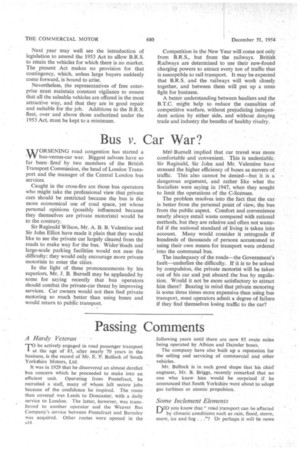Bus v. Car War?
Page 16

If you've noticed an error in this article please click here to report it so we can fix it.
WORSENING road congestion has started a bus-versus-car war. Biggest salvoes have so far been fired by two members of the British Transport Commission, the head of London Transport and the manager of the Central London bus services.
Caught in the cross-fire are those bus operators who might take the professional view that private cars should be restricted because the bus is the more economical use of road space, yet whose personal opinions (possibly influenced because they themselves are private motorists) would be to the contrary.
Sir Reginald Wilson, Mr. A. B. B. Valentine and Sir John Elliot have made it plain that they would like to see the private car largely cleared from the roads to make way for the bus. Wider roads and large-scale parking facilities would not ease the difficulty: they would only encourage more private motorists to enter the cities.
In the light of these pronouncements, by his superiors, Mr. J. B. Burnell may be applauded by some for saying recently that bus operators should combat the private-car threat by improving services. Car owners would not then find private motoring so much better than using buses and would return to public transport. MrS Burnell implied that car travel was more comfortable and convenient. This is undeniable. Sir Reginald, Sir John and Mr. Valentine have stressed the higher efficiency of buses as movers of traffic. This also cannot be denied—but it is a dangerous argument, and rather like what the Socialists were saying in 1947, when they sought to limit the operations of the C-licensee.
The problem resolves into the fact that the car is better from the personal point of view, the bus from the public aspect. Comfort and convenience nearly always entail waste compared with rational methods, but they are relative and often not wasteful if the national standard of living is taken into account. Many would consider it retrograde if hundreds of thousands of persons accustomed to using their own means for transport were ordered into the communal bus.
The inadequacy of the roads—the Government's fault—underlies the difficulty. If it is to be solved by compulsion, the private motorist will be taken out of his car and put aboard the bus by regulation. Would it not be more satisfactory to attract him there? Bearing in mind that private motoring is some three times more expensive than using bus transport, must operators admit a degree of failure if they find themselves losing traffic to the car?












































































